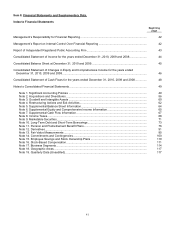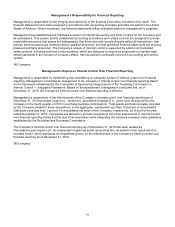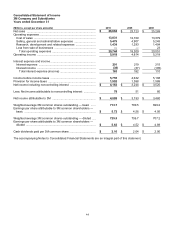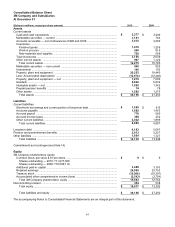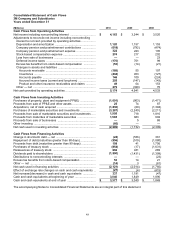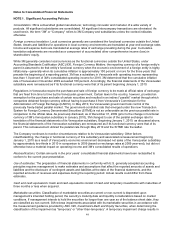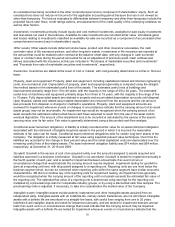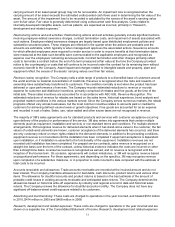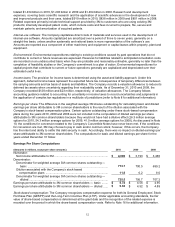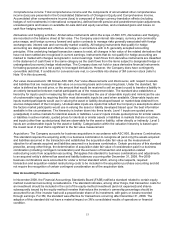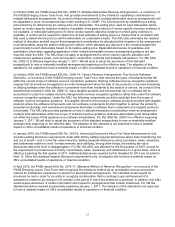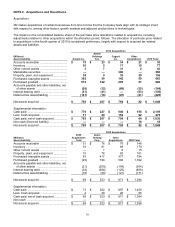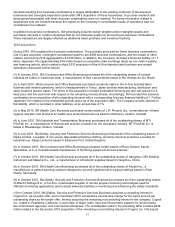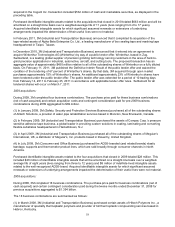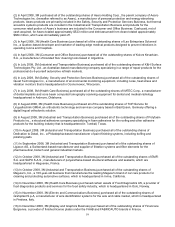3M 2010 Annual Report Download - page 55
Download and view the complete annual report
Please find page 55 of the 2010 3M annual report below. You can navigate through the pages in the report by either clicking on the pages listed below, or by using the keyword search tool below to find specific information within the annual report.49
Notes to Consolidated Financial Statements
NOTE 1. Significant Accounting Policies
Consolidation: 3M is a diversified global manufacturer, technology innovator and marketer of a wide variety of
products. All significant subsidiaries are consolidated. All significant intercompany transactions are eliminated. As
used herein, the term “3M” or “Company” refers to 3M Company and subsidiaries unless the context indicates
otherwise.
Foreign currency translation: Local currencies generally are considered the functional currencies outside the United
States. Assets and liabilities for operations in local-currency environments are translated at year-end exchange rates.
Income and expense items are translated at average rates of exchange prevailing during the year. Cumulative
translation adjustments are recorded as a component of accumulated other comprehensive income (loss) in
shareholders’ equity.
While 3M generally considers local currencies as the functional currencies outside the United States, under
Accounting Standards Codification (ASC) 830, Foreign Currency Matters, the reporting currency of a foreign entity’s
parent is assumed to be that entity’s functional currency when the economic environment of a foreign entity is highly
inflationary—generally when its cumulative inflation is approximately 100 percent or more for the three years that
precede the beginning of a reporting period. 3M has a subsidiary in Venezuela with operating income representing
less than 1.0 percent of 3M’s consolidated operating income for 2010. 3M determined that the cumulative inflation
rate of Venezuela in November 2009 exceeded 100 percent. Accordingly, the financial statements of the Venezuelan
subsidiary were remeasured as if its functional currency were that of its parent beginning January 1, 2010.
Regulations in Venezuela require the purchase and sale of foreign currency to be made at official rates of exchange
that are fixed from time to time by the Venezuelan government. Certain laws in the country, however, provided an
exemption for the purchase and sale of certain securities and resulted in an indirect “parallel” market through which
companies obtained foreign currency without having to purchase it from Venezuela’s Commission for the
Administration of Foreign Exchange (CADIVI). In May 2010, the Venezuelan government took control of the
previously freely-traded parallel market. The government-controlled rate that emerged under the new Transaction
System for Foreign Currency Denominated Securities (SITME) is not as unfavorable as the previous parallel rate in
comparison to the official rates. As previously disclosed, as of December 31, 2009 (prior to the change in functional
currency of 3M’s Venezuelan subsidiary in January 2010), 3M changed to use of the parallel exchange rate for
translation of the financial statements of its Venezuelan subsidiary. Beginning January 1, 2010, as discussed above,
the financial statements of the Venezuelan subsidiary are remeasured as if its functional currency were that of its
parent. This remeasurement utilized the parallel rate through May 2010 and the SITME rate thereafter.
The Company continues to monitor circumstances relative to its Venezuelan subsidiary. Other factors
notwithstanding, the change in functional currency of this subsidiary and associated remeasurement beginning
January 1, 2010 as a result of Venezuela’s economic environment decreased net sales of the Venezuelan subsidiary
by approximately two-thirds in 2010 in comparison to 2009 (based on exchange rates at 2009 year-end), but did not
otherwise have a material impact on operating income and 3M’s consolidated results of operations.
Reclassifications: Certain amounts in the prior years’ consolidated financial statements have been reclassified to
conform to the current year presentation.
Use of estimates: The preparation of financial statements in conformity with U.S. generally accepted accounting
principles requires management to make estimates and assumptions that affect the reported amounts of assets and
liabilities and the disclosure of contingent assets and liabilities at the date of the financial statements, and the
reported amounts of revenues and expenses during the reporting period. Actual results could differ from these
estimates.
Cash and cash equivalents: Cash and cash equivalents consist of cash and temporary investments with maturities of
three months or less when acquired.
Marketable securities: Classification of marketable securities as current or non-current is dependent upon
management’s intended holding period, the security’s maturity date and liquidity considerations based on market
conditions. If management intends to hold the securities for longer than one year as of the balance sheet date, they
are classified as non-current. 3M reviews impairments associated with its marketable securities in accordance with
the measurement guidance provided by ASC 320, Investments-Debt and Equity Securities, when determining the
classification of the impairment as “temporary” or “other-than-temporary”. A temporary impairment charge results in




